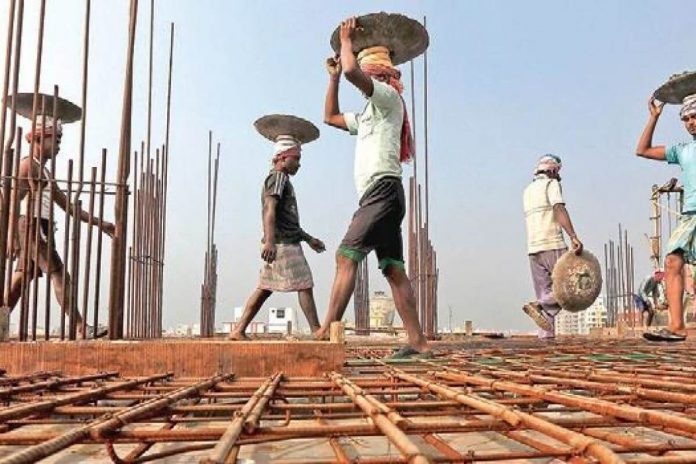This article is written by Meenal Sharma, from Vivekananda Institute of Professional Studies. In this article, the author has analysed the MHA order on payment of wages that was passed by the Central Government to ensure payment of full wages which has been challenged by the employers of different establishments before the Supreme Court.
Table of Contents
Introduction
Amidst the global COVID-19 pandemic the plight of workers especially migrant workers is deplorable. With the entire country being shut down, wage workers are suffering from a great deal of hardship as they are denied basic wages by their employers as the industrial establishments all over the world are at a standstill. Certain classes of workers are not even provided with the basic necessities. On the other hand, the employers are financially burdened as they are obliged to pay wages to their workers but no revenue is being generated. Thus, they are unable to provide wages. This is a dilemma for the government as they cannot force the employers to provide wages to their workers when they have no source of revenue. But they need to take some measures for the employees, especially wage workers who are completely dependent on such wages. In this article, we will discuss the Ministry of Home Affairs order which was passed by the Central Government to ensure payment of full wages which has been challenged by the employers of different establishments before the Hon’ble Supreme Court.
Background on payment of wages during the lockdown
Advisory by the Ministry of Labour and Employment
On 20th March 2020, the Ministry of Labour and Employment issued an Advisory to employers of public and private establishments. It advised them to cooperate by not terminating employees especially casual and contract workers and not to reduce their wages. It further stated that if the place of employment is not in function due to the COVID-19 pandemic, its workers will be deemed to be on duty. After this, the Ministry of Home Affairs order was issued.
Ministry of Home Affairs order
On 29th March 2020, the Ministry of Home Affairs issued an order to deal with the situation of lockdown and economic hardship of migrant workers. The Home Secretary by its powers conferred under Section 10(2)(1) of Disaster Management Act 2005 as Chairperson of the National Executive Committee directed the State governments and authorities along with Union Territory governments to issue orders to the District Magistrate or Deputy Commissioner and Senior Superintendent of Police or Superintendent of Police or Deputy Commissioner of Police who are personally liable to ensure implementation of the following additional measures:
- The State government and Union Territory government must ensure temporary shelters, food, etc for the poor and needy including the migrant workers who are stranded in their state or union territory due to lockdown.
- Migrants who have moved out to reach their hometown must be kept in the nearest shelter of the state or union territory government for 14 days after proper screening.
- All the employers whether belonging to industries, shops or commercial establishments shall ensure payment of wages to their employees without any deduction for the period their establishments were shut during the lockdown period.
- The landlords of workers including the migrant workers must not demand rent from them for a period of one month.
- If landlords are forcing labourers and students to vacate their premises, they would be liable under the Act.
If there is any violation of any of the directions the State or Union territory government can take action under the Act.
Laws regarding payment of wages
Payment of Wages Act, 1936
The objective of The Payment of Wages Act, 1936 is to regulate the payment of wages in certain classes of employed persons. Firstly, the date of payment of wages and secondly, deduction of wages as fines or otherwise. This Act contains provisions to ensure payment of wages. Section 3 of the Act, 1936 provides that the employer is obligated to pay wages to all workers employed by him including permanent, temporary, casual and badli workers. The Section 3(2) of the Payment of Wages of Act, 1936 and Section 21 of the Contract Labour (Regulation and Abolition) Act, 1970 further specifies that payment of wages is the responsibility of the employer if the contractor fails to do so.
The MHA order dated 29.03.2020 provided that wages must be paid to all casual and contractual workers.
Industrial Disputes Act, 1947
The Industrial Disputes Act, 1947 defines ‘worker’ as any person who is employed in an industry to do manual, unskilled, skilled, technical, operational, clerical or supervisory work for hire or reward. The terms of employment can be expressed or implied but it cannot be that of managerial or administrative capacity. It also excludes workers employed in a supervisory capacity and those who are paid wages above ₹10,000 per month.
Section 2(gg)(rr) of the Act defines ‘wages’ as all remuneration that can be expressed in terms of money that would be payable to a worker for his employment or work done in such employment. It includes allowances that the worker is entitled to such as dearness allowance, house accommodation, the supply of water, medical light or any other amenity or service or concessional supply of articles such as food grains, travelling concession or a commission for the promotion of sales or business. It excludes any bonus, the contribution paid or payable by the employer or any pension/provident fund or any gratuity payable on the termination of a worker.
The Act does not contain any provisions to deal with any national emergencies such as the COVID-19 pandemic.
Validity of order challenged
After the Ministry of Home Affairs order was issued, few States extended this beyond 31st March 2020. Some states issued new orders under the Epidemic Diseases Act, 1897 which stated that employees of private establishments must be treated to be on duty and should be fully paid. Various industries, firms and MSMEs challenged the Ministry of Home Affairs order before the Supreme Court stating that it was unconstitutional on various grounds such as being violative of Article 19. They said that private companies cannot be financially burdened by such order as the companies are shut during the lockdown and if they are forced to pay the salaries of employees during this period, their industrial units will collapse as no revenue is generated during the period.
Irrespective of the Ministry of Home Affairs order, some employers took measures like they reduced the salaries of their employees, imposed leave without pay and in some cases terminated large numbers of employees. Certain establishments even declared bankruptcy. As difficulties were faced by the workers, some trade unions and workers filed counter petitions seeking protection from these measures and demanded full payment of wages.
Rashtriya Shramik Aghadi, a contract labourer’s union filed a petition in Bombay High Court. On 12th May 2020, the Aurangabad bench of the High Court held that the policy of ‘no work no wages’ cannot be applied for the COVID-19 pandemic situation. It further directed the employers to ensure that full wages should be paid to employees for March, April and May.
On 17th May 2020, the Ministry of Home Affairs issued guidelines concerning lockdown 4.0. There were relaxations in the lockdown which permitted all activities barring a few such as schools, colleges and international travel except for medical purposes and those permitted by the Ministry of Home Affairs, etc.
The restrictions were lifted in the country which allowed private offices and industrial units to operate subject to guidelines issued by the Ministry of Home Affairs and the order dated 29 March 2020 was withdrawn from 18th May 2020. This allows the employers to regulate the payment of wages, lay-off, retrenchment as per the normally applicable labour laws.
Disaster Management Act, 2005
The ambit of the Disaster Management Act, 2005 is wide. Although the Act does not cover the issue of payment of wages to employees and does not give any power to the Central or State governments to do the same, the directions made under the Ministry of Home Affairs order are as per the provisions of the Act. Section 10(2)(1) of the Act empowers the National Executive Committee to lay directions to direct the ministries and departments of the government to prepare for disaster management plans.
Section 51 of the Act provides for punishment for obstruction and non-compliance of the direction made under this Act including the National Executive Committee for imprisonment which may extend up to 1 year or fine or both. However, if such obstruction or refusal ends up in the loss of lives or imminent danger to life, the imprisonment may extend up to 2 years. Further, Section 72 is a non-obstante clause which states that the Act shall have an overriding effect, i.e. the provisions of this Act shall be applicable if there is anything inconsistent in some other law, for the time this Act is in force. This means that it overrides the Industrial Disputes Act, 1947.
Therefore, the order dated 29.03.2020 shall continue to be applicable until it is set aside or modified by any High Court or the Supreme Court.
Honourable Supreme Court on the Ministry of Home Affairs order
On June 12, 2020, the Supreme Court heard the batch of petitions against the Central Government’s Ministry of Home Affairs order under the Disaster Management Act, 2005 dated 29th March 2020, the advisory issued by the Ministry of Labour and Employment other subsequent orders by various States that directed employers to make full payment of wages to their employees and not terminate them for the period their establishments were shut during the lockdown.
The bench comprising of Justices Ashok Bhushan, Sanjay Kishan Kaul and M. R. Shah directed the following interim measures to be taken by industries, factories, private establishments, trade unions, employees associations, etc:
- No coercive action will be taken against employers for failure to pay wages till the end of July but the employers shall negotiate with their employees with respect to payment of wages for the period their establishments were shut down due to lockdown may negotiate with them and directly enter into settlements with the employees or workers or involve labour authorities to intervene in the negotiations. Further, employers whose establishments were operating during the lockdown may also enter into negotiations with their employees.
- Employers that have decided to negotiate with their employees should communicate and publicise their intentions to their employees so that their participation can be included. Any settlement thus received will be without prejudice to the rights of the employers and employees pending this adjudication.
The Central government is required to file an affidavit on the legality of the Ministry of Home Affairs order dated 29.03.2020 and that the order shall continue to be applicable.
How other countries have dealt with similar problems
Every country is trying to enhance the capabilities of their employers to pay employees during the COVID-19 pandemic by introducing various schemes.
United Kingdom
Employers can get 80% of funding from the government for 3 months for giving salaries of workers. In Ireland, the government has provided a temporary subsidy of 85%.
United States
The government has provided support of $1200 per adult and $500 for children. $ 250 million are provided as insurance against unemployment.
Japan
All citizens receive a cash payment of ¥100,000.
South Korea
The Central government provides relief checks to about 14 million households with $829 per household.
France
Employees will receive an allowance of 84% of their salaries, whereas minimum wage workers will get 100% of their salary.
Denmark
For 3 months, 75% of the wages are paid if employers do not lay off the employees.
Austria
90% of gross salaries to be paid for salaries below €1700, 85% for salaries below €5,370. Apprentices to get full salary.
Spain
Workers will receive full salary and there is a bar on dismissing from employment.
Germany
€26 million have been allotted to an insurance fund that guarantees 60% of the basic pay to workers.
Australia
Subsidy worth 130 billion Australian dollars for business, i.e. 6.5% of their GDP.
China
Temporary living allowances to be provided to the migrant workers.
Canada
For those who are unemployed as a result of the COVID-19 crisis, 2000 Canadian dollars are paid every month.
Conclusion
Amongst such difficult times, it is important to ensure that basic necessities such as salaries and wages of workers are paid to them. It is indispensable to provide wages to workers and if employers are unable to provide the same due to financial burdens, then the government must take necessary action. It is irrelevant whether such wages are paid by their employers or the government. The government must provide wage stimulus to the employers who are unable to generate revenue as establishments are at a standstill. As per the decision of the Apex Court, the employers and employees shall negotiate amongst themselves and arrive at a consensus. If needed, they shall allow the intervention of labour authorities to reach a settlement.
References
- https://www.mha.gov.in/sites/default/files/MHA%20Order%20restricting%20movement%20of%20migrants%20and%20strict%20enforement%20of%20lockdown%20measures%20-%2029.03.2020.pdf
- https://www.mondaq.com/india/employment-and-workforce-wellbeing/937246/mha-withdraws-order-requiring-compulsory-payment-of-wages
- https://www.livemint.com/news/india/payment-of-wages-during-lockdown-no-more-mandatory-govt-withdraws-order-11589823719789.html
- http://theleaflet.in/right-to-wage-during-lockdown-due-to-covid-19/#:~:text=The%20Section%2010(2)%20(,for%20preparing%20disaster%20management%20plans.
LawSikho has created a telegram group for exchanging legal knowledge, referrals and various opportunities. You can click on this link and join:
 Serato DJ Crack 2025Serato DJ PRO Crack
Serato DJ Crack 2025Serato DJ PRO Crack











 Allow notifications
Allow notifications


